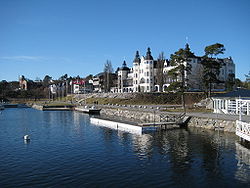
Saltsjöbaden Agreement
Encyclopedia

Sweden
Sweden , officially the Kingdom of Sweden , is a Nordic country on the Scandinavian Peninsula in Northern Europe. Sweden borders with Norway and Finland and is connected to Denmark by a bridge-tunnel across the Öresund....
labor market treaty signed between the Swedish Trade Union Confederation
Swedish Trade Union Confederation
The Swedish Trade Union Confederation , commonly referred to as LO, is a national trade union centre, an umbrella organisation for fifteen Swedish trade unions that organise mainly "blue-collar" workers...
(sv. Landsorganisationen, LO) and the Swedish Employers Association
Swedish Employers Association
The Swedish Employers Association , was a Swedish employers' organization founded in 1902. SAF in 2001 merged with Sveriges Industriförbund and formed Svenskt Näringsliv ....
(sv. Svenska Arbetsgivareföreningen, SAF) on December 20, 1938, that became a model for other agreements. The rules on industrial action
Industrial action
Industrial action or job action refers collectively to any measure taken by trade unions or other organised labour meant to reduce productivity in a workplace. Quite often it is used and interpreted as a euphemism for strike, but the scope is much wider...
has come to be regarded almost as general legal principles of conflicts between the labor market forces. The agreement cemented the Swedish social norm that the two sides shall conclude agreements without interference by government. The agreement is still in effect, with the latest changes being made in 1976.
In 2007, the LO, the Council for Negotiation and Co-operation (sv. Privattjänstemannakartellen, PTK) and the Confederation of Swedish Enterprise
Confederation of Swedish Enterprise
The Confederation of Swedish Enterprise is a major interest organisation for business and industry in Sweden. It has 48 member associations representing close to 55.000 member companies with more than 1.5 million employees....
(a successor organisation to the Swedish Employers Association) began negotiations towards a new agreement at the initiative of the Confederation of Swedish Enterprise. The negotiations, however, were suspended in March 2009.
History
Since the Swedish General StrikeSwedish General Strike
The Swedish General Strike of August 4 to September 4, 1909, was a general work stoppage by over 300,000 individuals all over Sweden. It was the first major conflict between the Swedish Trade Union Confederation , and the Swedish Employers Association...
of 1909 the labour market had been characterized by unregulated conflict, with the SAF and LO as the main actors. A restrictive legal framework was discussed, but was met with critique both from the SAF and LO. After the Social democratic
Swedish Social Democratic Party
The Swedish Social Democratic Workers' Party, , contesting elections as 'the Workers' Party – the Social Democrats' , or sometimes referred to just as 'the Social Democrats' and most commonly as Sossarna ; is the oldest and largest political party in Sweden. The party was founded in 1889...
government's bill was rejected in parliament in 1935, negotiations started between the SAF and LO, which resulted in the Saltsjöbaden Agreement in 1938. Especially the chapters on industrial action were based largely on the previous proposals.
To implement the Saltsjöbaden Agreement the LO had to change their statutes. The new statutes included authorizing the secretariat to suspend conflict aid to a member union who refuses to approve the secretariat's proposals for settlement. The secretariat may also prohibit a strike if it covers more than three percent of the members of a member union, or if it is in danger of becoming so large through lockout. member unions of the LO were also required to have a provision in their statutes empowering the board of the confederation to decide on issues of contract and industrial action, even against members expressed desire.
Reception to the treaty was mixed. LO-affiliated Swedish Transport Workers' Union
Swedish Transport Workers' Union
The Swedish Transport Worker's Union was created in 1897 and is today part of the Swedish Trade Union Confederation...
(sv. Svenska Transportarbetareförbundet) Transport) commented that "in fear of death, one commits suicide" and objected especially to the fourth chapter, which governs industrial action
Industrial action
Industrial action or job action refers collectively to any measure taken by trade unions or other organised labour meant to reduce productivity in a workplace. Quite often it is used and interpreted as a euphemism for strike, but the scope is much wider...
by union
Trade union
A trade union, trades union or labor union is an organization of workers that have banded together to achieve common goals such as better working conditions. The trade union, through its leadership, bargains with the employer on behalf of union members and negotiates labour contracts with...
s, as "repugnant".
The Saltsjöbaden Agreement launched an era of consensus and cooperation in the Swedish labour market, the so-called "saltsjöbadsandan" (Saltsjöbaden spirit), which characterized labour policy in Sweden at least until the late 1960s, when the LKAB
LKAB
LKAB is a Swedish mining company. The company mines iron ore at Kiruna and at Malmberget in northern Sweden. The company was established in 1890, and has been 100% state-owned since the 1950s...
conflict marked the start of a period of confrontation and decreasing consensus. In the early 1980s, the parties again sought consensus, which culminated in the signing of the Utvecklingsavtalet (Development Agreement) between the LO, SAF and PTK.

